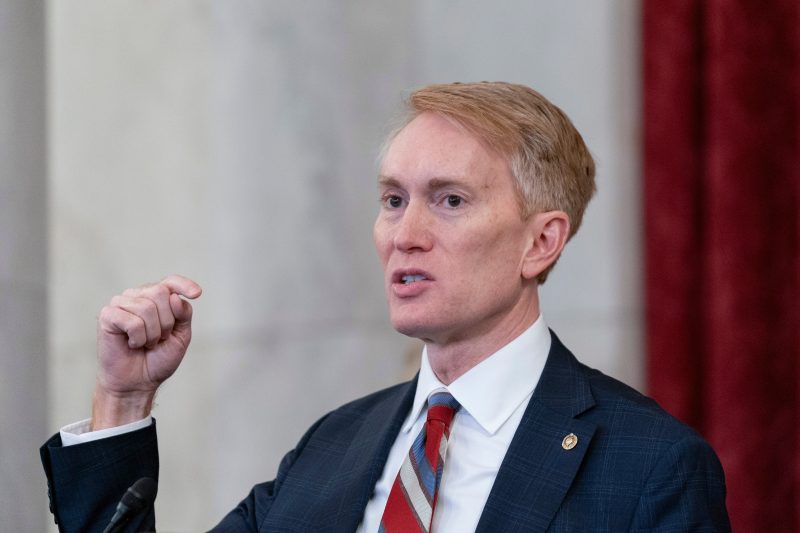Sen. James Lankford (R-Okla.) receives lots of compliments from both sides of the aisle.
“High level of trust in him,” said Sen. J.D. Vance (R-Ohio), a first-year member and one of the most conservative in the chamber.
“I like James. I think he’s earnest. I think he’s smart,” said Sen. Brian Schatz (D-Hawaii), one of the most liberal members finishing his 11th year in office.
But Lankford is now heading into the most critical phase of his 13 years in Congress, four in the House and nine in the Senate.
Taking the lead on a major bipartisan negotiation, Lankford finds himself well respected, but facing doubters. No one is quite sure whether the 55-year-old former Baptist youth minister can rise to this occasion and, as they so often say on Capitol Hill, land the plane.
This isn’t just any negotiation. It’s not one of those typical spending deals where one side proposes X number of dollars to be spent on an issue, while the other proposes Y dollars, leaving a relatively easy settlement of cutting the differences in half for Z dollars.
Lankford is the top Republican trying to solve the single most difficult issue Congress has repeatedly failed to comprehensively address over the last 20 years — the issue of migrant crossings at the Mexican border.
And the fate of these talks isn’t just relegated to the Southwest border. Their success is considered the mandatory linchpin for being able to pass a global security package stretching from Europe to the Middle East and the Far East.
“We’re just trying to really figure out how do we actually solve this. There’s lots of different pieces,” Lankford told reporters a couple of days ago, sticking to his characteristic understatements.
He acknowledged that another failure on border and immigration issues — just as happened in 2006, 2007, 2013 and 2017 — would have ramifications all across the globe because of the four-legged stool that has been assembled late in an otherwise mostly fruitless year of congressional legislating.
“We have to be able to solve this,” Lankford said.
As various crises erupted around the globe, leaving President Biden requesting billions of dollars in emergency aid, Senate leaders did that traditional thing they have done over the last 15 or so years: decided to roll all the separate pieces into one massive bill, calling it an “emergency supplemental” funding plan.
The request included more than $60 billion to help Ukraine’s defenses against Russia; $14 billion for Israel; $9 billion for humanitarian aid in these regions; more than $7 billion to shore up Taiwan’s defenses; and about $14 billion for increasing the number of U.S. border agents and other administrative agents.
The concept — a Senate classic — was that there would be something for everyone: Those who despise Russian President Vladimir Putin saw Ukraine money; those focused on Chinese aggression had Taiwan defense funds; those focused on defending Israel had their piece of the pie.
And, for Republicans fixated on border crossings, those additional funds might help there. But as conservative voters grew increasingly skeptical of supporting Ukraine, Republicans decided they needed a bigger trade-off for going along with those funds and demanded policy changes to border laws.
So now Lankford — who has been part of a small bipartisan group talking about border and immigration policy since they visited the border in Texas and Arizona in January — has been tasked with leading these negotiations in search of the elusive solution to this decades-long crisis.
His demeanor has won praise for years, explaining why he has previously led the bipartisan National Prayer Breakfast and received the highly sensitive task of co-chairing the Senate Ethics Committee.
But these negotiations are an entirely different game.
“What I’ve learned is that it’s pretty easy to be in the room, and it’s pretty easy to talk about the issues. It’s really hard to get to yes, because the result is ultimately going to split your caucus,” said Sen. Chris Murphy (D-Conn.), who is Lankford’s partner in the high-stakes talks.
Murphy, first elected to the Senate in 2012, spent most of his early years a bit more aligned with Democratic firebrands, but in recent years refashioned himself into a bipartisan dealmaker.
After several failed efforts, Murphy worked with Sens. John Cornyn (R-Tex.) and Thom Tillis (R-N.C.) last year to come up with a modest-but-important gun violence bill, the first of its kind in 30 years. And he worked with the group that crafted the bill that reshaped Congress’s role in presidential elections following the Jan. 6, 2021, Capitol attack.
He then joined a group of eight senators that included Lankford who traveled to the border, with Cornyn leading the trip in Texas and Sen. Kyrsten Sinema (I-Ariz.) leading the portion in Arizona. They continued to talk about the issue throughout the year, informally — sometimes in small meetings, sometimes via text messages.
“This is not a new thing that just started a couple weeks ago. This has been an ongoing conversation,” Lankford told reporters.
Murphy appreciates how Lankford has studied the issue, in part through his top Republican spot on a border policy subcommittee. “He’s one of the most intellectual, detail-oriented guys in the Senate. And on immigration policy, you need to know the details. It’s the most complicated law on the books,” Murphy said in an interview.
But the dysfunctional House, struggling to elect a speaker in January and then shutting down for three weeks in October to find a new speaker, left the senators doubtful that there was any point in even trying a big, bipartisan border-immigration deal.
In the last few weeks, as the situation grew dire in Ukraine and the Israel-Gaza war began, Democrats shifted their views enough that they considered these matters so important that they would be willing to set aside long-standing demands for a path to citizenship or permanent resident status for millions of undocumented immigrants who have been living in the United States.
And that move, Democrats say, is not getting nearly enough appreciation from Lankford and Republicans, who they say are endangering global security over a long-standing domestic policy dispute.
“The question for all of us to ask is, 50 years from now, how will this Congress be defined? And my judgment is that we will be defined by whether we let Putin take a European country by force, not whether we tweak the asylum laws,” Schatz, one of Murphy’s closest friends, said.
And Schatz, like other Democrats, questions whether some Republicans injected the border policy issue merely to sabotage the entire legislative package.
“Democrats have displayed a historical willingness to entertain some pretty tough measures at the United States border. Republicans should take the win. Rather than get greedy and blow up the whole thing, unless their original purpose is to blow up the whole thing,” Schatz said.
But the staunchest conservatives, at least in the Senate, maintain they care enough about the border that they are willing to keep up funding for Ukraine.
“Look, the one thing I care more about than not funding an endless war in Ukraine is securing the southern border. There’s certainly a universe where if I think there’s sufficient border security, I’d be willing to make a trade for it,” Vance said.
“I think the Dems need to understand that we view this — the southern border — as a national security crisis,” Senate Minority Whip John Thune (R-S.D.) told reporters, vowing that Republicans will filibuster a bill for all the global aid if it does not meet GOP border demands.
Having won reelection last year, Lankford might have more freedom to broker a bipartisan deal without having to face his state’s deeply conservative GOP primary voters for almost five more years.
But others still aren’t sure whether someone so new to these types of negotiations, dealing with such a complex issue, can overcome all these obstacles, even with defeat being so potentially calamitous to other critical priorities.
“There are always people who want to blow everything up. I don’t think James is one,” Schatz said. “But to say he’s working in good faith, is different from saying that he’s going to be able to land the airplane.”





























